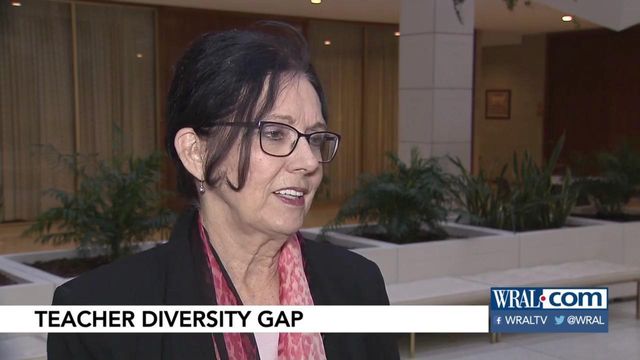Wake lawmaker calls for increased diversity in NC's Teaching Fellows program
A Wake County Democratic lawmaker is asking Republicans to join her in supporting legislation that she believes would help North Carolina recruit more teachers of color.
Posted — UpdatedRep. Cynthia Ball, D-Wake, announced on Twitter that she will be "working to increase the number and diversity" of North Carolina's Teaching Fellows. The state-funded program recruits students to study teaching by providing college tuition help in exchange for a promise to teach in North Carolina for at least four years. Of the 74 students participating in the current Teaching Fellows program, 83 percent are white.
"I think that students learn not just course content, but they identify with and relate better to a teacher that they think can understand them, so it's better if they look like them," Ball said.
"I'm looking for primary sponsors who are on the other side of the aisle. I do not want this to be a Democratic initiative," Ball added. "I think people like Rep. (Craig) Horn, I know, are working on this. Others are. So I am hopeful that we will start this session working together on these kinds of issues that we do find common ground in and not really care who gets the credit so to speak. This is not a Democratic idea. This is not a Republican idea. This is good for all of North Carolina."
Across North Carolina, 80 percent of teachers are white, while minority students make up 52 percent of the traditional public school body. The Teaching Fellows program, which relaunched last year without any apparent gender or race goals for the students it selects, comprises mostly white, mostly female students. The new Teaching Fellows program has also not partnered with any historically black colleges and universities, as it did in the past. Only one HBCU applied for the new program, North Carolina A&T State University. It was not selected.
Last week, the UNC Board of Governors, which oversees the new Teaching Fellows program, included expansion and diversity of the program as part of its legislative agenda:
“We need to have a significant expansion of the Teaching Fellows Program,” he said. “It’s one of the best bang for the buck that I can imagine. … We’re getting the very best students who are agreeing to be teachers in our public schools for the next four years for the price of tuition and fees. To me, that is an amazing deal, and we need to expand these Teaching Fellows scholarships.”
The governor said he also wants to encourage more diversity in teaching.
“That means more men and it means more people of color in the profession,” Cooper said. “I strongly believe our state government, our law enforcement, our education system ought to look like the people that it serves and protects ... It is important for us to have a diversity of teachers to reflect the diversity of students we have at our public schools.”
North Carolina's former Teaching Fellows Program, which ran from 1986 to 2011 and enrolled more than 10,600 students, also struggled to bring in more teachers of color. The program had a goal of selecting at least 20 percent minorities and at least 30 percent men. In the end, the program came up short. Overall, it had 17 percent minorities and 24 percent males.
“We fell short,” said Keith Poston, president and executive director of the Public School Forum of North Carolina, which ran the old Teaching Fellows Program. “That's one of the areas that didn't work.”
It wasn't for lack of trying, Poston added. “It is a vexing problem that still faces education today. I mean, here we are are, our public school students are less than 50 percent white, yet our teaching workforce is 80 percent white and 80 percent female, roughly the same numbers we had 30 years ago,” he said.
Teacher diversity is not only an issue in North Carolina. On Monday, former U.S. education secretary John King shared WRAL's stories on Twitter and said there is an "urgent need" for teacher preparation programs across the country to increase the pipeline of teachers of color. He said there is also work to be done to support and retain teachers of color.
Related Topics
• Credits
Copyright 2024 by Capitol Broadcasting Company. All rights reserved. This material may not be published, broadcast, rewritten or redistributed.






